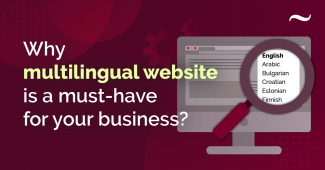
Thanks to the rapid digital and technological development, consumers have an unlimited choice of products and services. This also means that businesses have unlimited opportunities to efficiently find customers looking for the solutions they offer.
Furthermore, if your business is active in the B2B, B2C or even B2G market, a powerful website is one of the most important tools that requires constant development during this digital era. Having a user-friendly and content-rich website offering value to potential customers is great, but not enough. According to TIME, on the average your site has only 15 seconds to get visitors’ attention, build brand awareness, and secure a sale.
We recommend to ask your teammates who are responsible for website analytics the following questions: How long do users stay on your website? In which languages do these visitors usually read the online content? The answer could really make you change your mind about the relevance of this topic.
A homepage is like “the first insight” and no one wants to waste this opportunity. According to a report from CSA Research, 56% of internet users either spend more time on sites in the language they speak, or disregard English-language URLs altogether.
A multilingual website is the solution to making your customers stay longer and converting this opportunity into sales.
What is a multilingual website?
A multilingual website is a site that offers content in various languages for the user to select the most relevant one. If a business wishes to reach international audiences and expand in global markets but does not have a multilingual website, it is a wasted opportunity. Here are the main reasons for you to include website translation into your business or marketing strategy.
Multilingual website offers new market opportunities
At the end of day, the main goal of every business is to make money, attract new customers, “go global”, push up sales, increase brand awareness, and make sure people talk about how awesome their products or services are. However, one in four European SMEs consider the language barrier their biggest challenge in developing business across borders.
Imagine that your business has overcome this challenge and you have decided to go ahead with homepage localisation in target languages. Traffic grows, awareness spreads, credibility increases. And at this point you can really enjoy the fruit of your labour. By adding extra languages to your website, there is no doubt that your business will grow. Multilingual website is a must if you plan to expand your business in new markets and reach global audiences. In fact, is there anyone who is not planning to do that?
Website engagement is based on customer trust and loyalty
For businesses, it is hard to create a personalised experience for every website visitor. A translated website in the language of your potential customers is the most value a business can add to the page. It builds trust and loyalty and can definitely contribute to higher sale volumes, as consumers prefer product information in the language they speak. According to CSA Research, if there is a choice between buying two similar products, 76% of customers will choose the one that offers information in the language they speak. Furthermore, website localisation offers extra credibility for your brand, as users tend to perceive your page as a trustworthy and global one.
Website translation to increase traffic and improve multilingual SEO
If someone is looking for a solution to a problem or a product that meets his/her needs, they most probably will rely on search engines such as Google, Bing, Yandex and many more. 9 Internet users in 10, if given the choice, prefer to browse in the language they speak. It means that there is a big chance that your local or international competitors who already have a multilingual website will outrun you even if the customers are looking for products exactly like yours.
Moreover, 67% of Europeans do not speak English well enough to maintain a conversation, let alone to shop online. There are 24 official languages in the EU and more than 446 million people use them on daily basis. What if your webpage could speak all of these languages? Undoubtedly, a multilingual website is an advantage that offers many opportunities to your business to boost sales and earn the loyalty of your customers for a long-term relationship.
Translated websites also add extra value from the SEO (search engine optimisation) point of view. Multilingual SEO is important to let search engines index translated pages, so that your business can be found on the first page of the search engine in the query language of your potential customers.
Use machine translation to quickly build multilingual websites in a cost-efficient manner
Website translation is a necessity to bring the business to the next level. But what is the most effective way to provide a multilingual website? Revenue generated by traditional translations can be as high as 20 times their cost, but often it is too expensive for SMEs. Moreover, it is a time-consuming process, requiring a lot of effort from your team or huge investments in outsource translation service providers. With every new landing page or update of your website, these costs accumulate and can become too much for a business.
To add new languages to your website, you have to duplicate every single page to manually add the translated content. These days, most businesses do not have enough time or resources to do this.
To solve this problem, choose machine translation! Tilde Website Translator is the best choice for business owners who strive to have a multilingual website: it is easy, fast, and cost-efficient. There is no need to code, manually translate, or duplicate pages: you define the target language, and Tilde Website Translator generates the plugin for your webpage that it is ready to be seamlessly integrated into all types of websites or e-commerce platforms. Machine translation technology automatically translates the content of the page, while the CMS editor can still make changes or adjust the use of the language, if needed. You should not worry about SEO indexing or technical details either as Tilde Website Translator does it all for you.
In today’s world of digital competition, businesses who are able to adapt to their target markets by offering a multilingual website win the competition race. Is your business one of them?

Ruben Martinez
Client Relationship ManagerGet started with a free trial